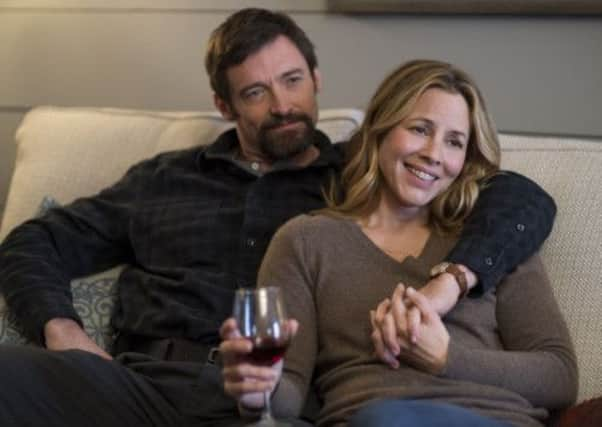Film review: Prisoners | Blue Jasmine | Austenland


Prisoners (15)
Directed by: Denis Villeneuve
Starring: Hugh Jackman, Jake Gyllenhaal, Viola Davis, Terrence Howard, Maria Bello
Star rating: * * * *
The results are just as noteworthy. Like a more downbeat Zodiac, Prisoners is a rich, expansive procedural revolving around a horrible crime in which a satisfactory resolution only seems to get further away from its protagonists the more they obsess over the case.
Advertisement
Hide AdChief among those protagonists is Hugh Jackman, on career-best form as Keller, the father of a young girl who goes missing during Thanksgiving. With only a few clues to go on, the police (led by Jake Gyllenhaal’s tough, no-nonsense detective) home in on Alex (Paul Dano) a young, emotionally distraught loner seen driving a camper van in the vicinity earlier in the day. Though Alex seems a likely suspect, when the evidence doesn’t stack up Keller takes matters into his own hands and does to Alex what he suspects he’s done to his daughter. What follows is a fantastically acted exploration of the emotional fall-out from an abduction and the morality of revenge.
Blue Jasmine (12A)
Directed by: Woody Allen
Starring: Cate Blanchett, Sally Hawkins, Alec Baldwin, Bobby Cannavale, Peter Sarsgaard
Star rating: * * *
One of Woody Allen’s great skills as a director is his ability to use brilliant actors the way Steven Spielberg deploys spectacle. In other words, even when a script or an idea isn’t quite up to scratch, he’s still able to unleash enough fireworks to distract attention from a film’s inherent weaknesses. In Blue Jasmine, those fireworks come courtesy of Cate Blanchett. Her performance as the titular Jasmine – a mentally disintegrating society wife forced to confront reality when her Bernie Madoff-style husband (Alec Baldwin) is put away for financial fraud – certainly helps the film transcend its blatant allusions to A Streetcar Named Desire.
With the film flashing back and forth between Jasmine’s opulent (but far from perfect) life in New York and her new, downsized existence in San Francisco with her adoptive sister and her blue-collar boyfriend, Blanchett embraces the Blanche DuBois-like nature of the character yet manages to reach Vivien Leigh-like levels of histrionics in much more subtle and naturalistic ways. Indeed, she’s so hypnotic, you almost don’t notice the way the supporting characters sound like Mills & Boon characters, or how dated and stereotypical Allen’s conceptions of regular life have become.
Austenland (12A)
Directed by: Jerusha Hess
Starring: Keri Russell, JJ Feild, Bret McKenzie, Jennifer Coolidge
Star rating: *
It’s a brave or foolish filmmaker that attempts to mock Jane Austen. Judging by this mirthless effort, Napoleon Dynamite co-writer Jerusha Hess – making her directorial debut – definitely falls into the latter camp. Lacking any of the wit or insight that can be found in many of the fine big and small-screen Austen adaptations, this is just a desperate attempt to hook in gullible fans hoping for a little Darcy-inflected romantic swooning.
Advertisement
Hide AdRevolving around a desperate-for-love Austen aficionado (Keri Russell) who travels from the US to England for an immersive holiday at the titular resort, what could have been an intriguing look at the division between romantic fantasy and reality is ruined by unappealing characters, lazy stereotypes and a sneering, condescending attitude on the part of the filmmakers towards those signing up for the experience.
Girl Most Likely (12A)
Directed by: Shari Springer Berman, Robert Pulcini
Starring: Kristen Wiig, Annette Bening, Matt Dillon, Christopher Fitzgerald
Star rating: * *
Advertisement
Hide AdIt would be unfair to knock Kristen Wiig too much for capitalising on the success of Bridesmaids with a film that requires her to remain in the (dis)comfort zone she established with that role. Her character in Girl Most Likely, though, has the added disadvantage of being similar to Bridesmaids’ Annie, but largely unfunny. Put that down to directors Shari Springer Berman and Robert Pulcini, who don’t seem to know what to do with Wiig, draining all the energy out of her character as she embarks on a downward spiral that sees her forced to return to the bosom of her dysfunctional blue-collar family. Cast as Imogene, a once-promising playwright with unfulfilled ambition, Wiig should be in her element here, but whether she’s trying to re-establish a bond with her crustacean-obsessed brother (Christopher Fitzgerald), bat eyelashes with a Backstreet Boys impersonator (Darren Criss), or get to grips with her crazy mother (Annette Benning), she can’t make her character connect. It doesn’t help that the plot spins into the sort of absurd, whimsical territory only Wes Anderson can really pull off. What a disappointment.
The Wicker Man: The Final Cut (15)
Directed by: Robin Hardy
Starring: Edward Woodward, Christopher Lee, Britt Ekland, Ingrid Pitt
Star rating: * * * *
Restored to something like director Robin Hardy’s original vision, this new and apparently final cut of The Wicker Man is a digitally remastered version of a workprint discovered in the Harvard Film Archives that Hardy had put together for a belated American release in the late 1970s.
Never before seen in British cinemas, its release coincides with the film’s 40th anniversary, therefore making it worth tracking down on the big screen ahead of its DVD and Blu-Ray reissue next month. Ditching the rubbish prologue added to the previous Director’s Cut a decade ago, the new version reorders some of the scenes, introduces Christopher Lee’s Lord Summerisle a little earlier and sees the addition of a couple of extra sequences that amp up the salacious and creepy atmosphere for which the film is already much admired.
It all helps it make a little more sense on a narrative level without diminishing everything that made it a cult classic in the first place. What’s remarkable about watching it again, though, is just how radical it seems as a film, with the folk songs, in particular, making it seem increasingly like a horror musical, not just a pagan-themed wig-out.